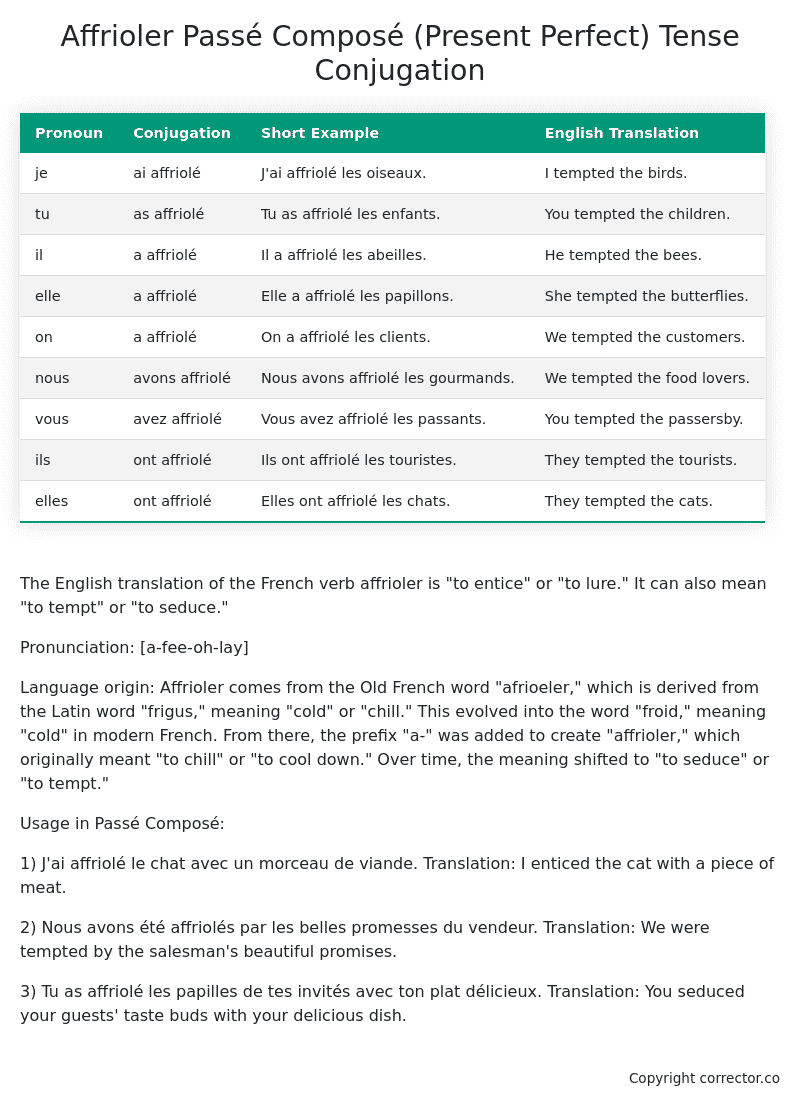Passé Composé (Present Perfect) Tense Conjugation of the French Verb affrioler
Introduction to the verb affrioler
The English translation of the French verb affrioler is “to entice” or “to lure.” It can also mean “to tempt” or “to seduce.”
Pronunciation: [a-fee-oh-lay]
Language origin: Affrioler comes from the Old French word “afrioeler,” which is derived from the Latin word “frigus,” meaning “cold” or “chill.” This evolved into the word “froid,” meaning “cold” in modern French. From there, the prefix “a-” was added to create “affrioler,” which originally meant “to chill” or “to cool down.” Over time, the meaning shifted to “to seduce” or “to tempt.”
Usage in Passé Composé:
1) J’ai affriolé le chat avec un morceau de viande.
Translation: I enticed the cat with a piece of meat.
2) Nous avons été affriolés par les belles promesses du vendeur.
Translation: We were tempted by the salesman’s beautiful promises.
3) Tu as affriolé les papilles de tes invités avec ton plat délicieux.
Translation: You seduced your guests’ taste buds with your delicious dish.
Table of the Passé Composé (Present Perfect) Tense Conjugation of affrioler
| Pronoun | Conjugation | Short Example | English Translation |
|---|---|---|---|
| je | ai affriolé | J’ai affriolé les oiseaux. | I tempted the birds. |
| tu | as affriolé | Tu as affriolé les enfants. | You tempted the children. |
| il | a affriolé | Il a affriolé les abeilles. | He tempted the bees. |
| elle | a affriolé | Elle a affriolé les papillons. | She tempted the butterflies. |
| on | a affriolé | On a affriolé les clients. | We tempted the customers. |
| nous | avons affriolé | Nous avons affriolé les gourmands. | We tempted the food lovers. |
| vous | avez affriolé | Vous avez affriolé les passants. | You tempted the passersby. |
| ils | ont affriolé | Ils ont affriolé les touristes. | They tempted the tourists. |
| elles | ont affriolé | Elles ont affriolé les chats. | They tempted the cats. |
Other Conjugations for Affrioler.
Le Present (Present Tense) Conjugation of the French Verb affrioler
Imparfait (Imperfect) Tense Conjugation of the French Verb affrioler
Passé Simple (Simple Past) Tense Conjugation of the French Verb affrioler
Passé Composé (Present Perfect) Tense Conjugation of the French Verb affrioler (this article)
Futur Simple (Simple Future) Tense Conjugation of the French Verb affrioler
Futur Proche (Near Future) Tense Conjugation of the French Verb affrioler
Plus-que-parfait (Pluperfect) Tense Conjugation of the French Verb affrioler
Passé Antérieur (Past Anterior) Tense Conjugation of the French Verb affrioler
Futur Antérieur (Future Anterior) Tense Conjugation of the French Verb affrioler
Subjonctif Présent (Subjunctive Present) Tense Conjugation of the French Verb affrioler
Subjonctif Passé (Subjunctive Past) Tense Conjugation of the French Verb affrioler
Subjonctif Imparfait (Subjunctive Imperfect) Tense Conjugation of the French Verb affrioler
Subjonctif Plus-que-parfait (Subjunctive Pluperfect) Tense Conjugation of the French Verb affrioler
Conditionnel Présent (Conditional Present) Tense Conjugation of the French Verb affrioler
Conditionnel Passé (Conditional Past) Tense Conjugation of the French Verb affrioler
L’impératif Présent (Imperative Present) Tense Conjugation of the French Verb affrioler
L’infinitif Présent (Infinitive Present) Tense Conjugation of the French Verb affrioler
Struggling with French verbs or the language in general? Why not use our free French Grammar Checker – no registration required!
Get a FREE Download Study Sheet of this Conjugation 🔥
Simply right click the image below, click “save image” and get your free reference for the affrioler present perfect tense conjugation!

Affrioler – About the French Passé Composé (Present Perfect) Tense
Formation of the Passé Composé
Set the auxiliary verb with either
Conjugate the auxiliary verb
Add the past participle
Common everyday usage patterns
Narrating Past Events
Sequential Actions
Describing Completed Actions
Interactions with other tenses
Imperfect Tense
Conditional and Future Tenses
Summary
I hope you enjoyed this article on the verb affrioler. Still in a learning mood? Check out another TOTALLY random French verb conjugation!


